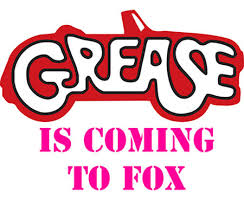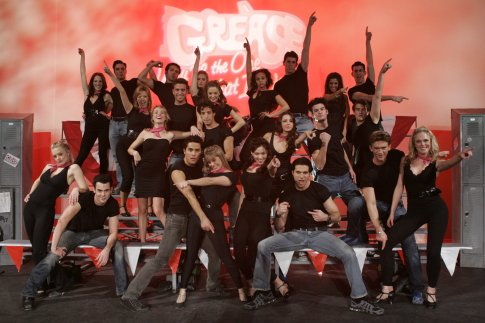There Are Worse Things Fox Could Do: Grease Live and TV’s Sad Affair with the Live Musical
 It seems that the problematic life of the Broadway musical has run full steam into the struggles of 21st century network television. For the last couple decades, the Broadway musical has been solidly taken over by (assumedly surefire) pre-sold properties like Mamma Mia!, The Wedding Singer, The Producers, and High Fidelity. Crossover actors and content allow Broadway producers to hedge their bets on recouping their quite sizable investments. Life’s hard all over. They need something to get tourists’ butts into very expensive seats on the Great White Way, and the people like seeing things they recognize.
It seems that the problematic life of the Broadway musical has run full steam into the struggles of 21st century network television. For the last couple decades, the Broadway musical has been solidly taken over by (assumedly surefire) pre-sold properties like Mamma Mia!, The Wedding Singer, The Producers, and High Fidelity. Crossover actors and content allow Broadway producers to hedge their bets on recouping their quite sizable investments. Life’s hard all over. They need something to get tourists’ butts into very expensive seats on the Great White Way, and the people like seeing things they recognize.
Now television, struggling in the era of multiple platform viewing and increased time-shifting, is turning to the clay feet of the musical for a wallop of financial and “special event” adrenaline. After 18 million Americans (hate) watched NBC’s live airing of The Sound of Music, it took less than five months for both NBC and Fox to announce their upcoming live musical projects, Peter Pan and Grease respectively. Of course this practice of airing live musicals has precedent. The New York-based 1950s live television era was bejeweled with live musical events. NBC’s 1955 airing of Peter Pan with Mary Martin garnered 64 million viewers. (Take that Carrie Underwood!) For the first time, television was bringing Middle America (and everyone else) the elusive sights and sounds of Broadway.
Today, the networks are struggling to find some way—other than awards shows—to draw a 21st century, distracted, i-device obsessed audience to their living rooms. The ratings success of The Sound of Music seems to have been just the encouragement needed to reproduce the tele-theatrical disaster that was Underwood’s performance. The selection of Grease by Fox seems to ignore a string of warning signs.
(1) As was the case with The Sound of Music, Grease is an iconic text. Just as most Americans can only imagine Julie Andrews descending the Alps, John Travolta and Olivia Newton-John are Grease to most. As many of the press announcements note, Grease is the highest grossing movie musical of all time. Casting is going to be a bear. (2) The Broadway version—even the latest incarnation that hybridized the Broadway and film versions—is not the 1978 Paramount film. The energy is different. The songs are different. This means something when one is trying to capitalize on an audience’s existing emotional attachment to a property. It is nearly impossible to deliver on such a promise when millions are saddled with memories of specific choreography, inflections, phrasing, etc. Overcoming this is no easy feat. (3) Television viewers have already chimed in on Grease and they did not emit a rousing “we go together.” NBC’s 2006 reality show Grease: You’re the One That I Want served as a televised audition for the 2007 Broadway revival’s Danny and Sandy and ranked 75th in annual Nielsens, garnering about a quarter the number of American Idol’s “hopelessly devoted” viewers. Fox’s Glee also took a shot at the musical with its own “Glease,” one of the lowest rated episodes of its drooping fourth season. (And let’s not even get started on Smash.)
As a devoted fan and scholar of the musical, I always try to root for the genre’s triumph over the jaded sensibilities of contemporary audiences, producers, and ticket buyers. (Although the lasting wounds from viewing 7th Heaven’s musical episode may never heal.) That said, I often find myself disappointed by the nasty effects a network’s or producer’s hope for commercial appeal has on the musical product itself. Although Paramount TV President Amy Powell sounds like a latter day Sylvester “Pat” Weaver (NBC 1950’s head of programming/chairman of the board and cheerleader for the “spectacular”) as she states, “Fox’s passion for engaging audiences with bold storytelling and live musical formats make it a perfect home for this special broadcast,” perhaps NBC’s current chairman Bob Greenblatt was a bit more honest and on point in his response to the Sound of Music, “We own it so we can repeat it every year for the next 10 years…Even if it does just a small fraction of what it did, it’s free to repeat it.” Who knows, maybe this new trend will catch fire and save the networks and produce a whole new generation of musical fans, or just maybe we’ll all get a real treat and Stockard Channing—high on Good Wife street cred—will reprise her role of Rizzo, only slightly more age inappropriate now than in 1978.





A very interesting article! I wonder if these upcoming musicals should be understood as a response to the newly “distracted, i-device” audiences, or instead if they should be taken simply as a new cycle in the network’s long tradition of semi-gimmicky event-based programming, including sporting events, game show events, awards shows, infotainment specials, etc.
I’m also intrigued by the notion that these TV networks are not wholly interested in musicals, but are interested in very specific musicals that are deemed family-friendly (Sound of Music and Grease) and not more challenging or (to me) interesting material like Chicago, Cabaret, etc. What this suggests, it seems, is that the networks have no interest in musicals per se, but in finding something that get both older and younger folks in front of their televisions (without time-shifting). Additionally, the selected texts seem to be generally devoid of race — and when there are highly qualified people of color (like SIX-TIME! Tony Award Winner Audra McDonald), there is an issue with casting. Very interesting piece that has provided a lot to chew on.